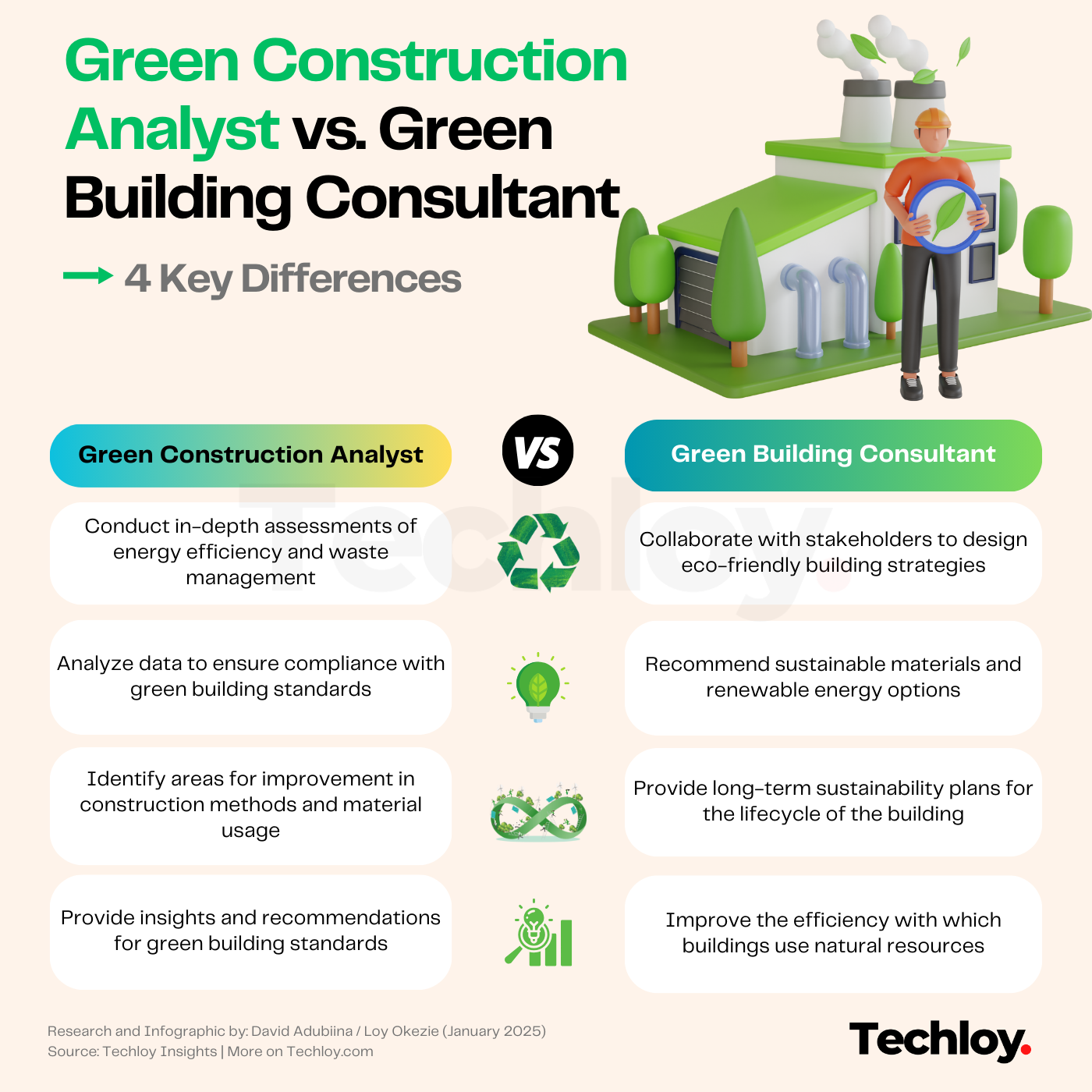All you need to know about a career as a Green Building Consultant
This guide will teach you their unique roles, how to become a Green Building Consultant, and the essential skills and certifications required for success.

Just as Green Construction Analysts are vital in maintaining a sustainable world, Green Building Consultants are even more in demand. This is because global carbon dioxide emissions continue to rise, with reports showing a roughly 1% increase as of 2022. These professionals play a critical role in designing and implementing eco-friendly building practices to combat climate change and promote energy efficiency.
However, you might be wondering—how are they any different from each other? While Green Construction Analysts focus primarily on evaluating sustainability during construction, Green Building Consultants take a broader approach. They ensure that every aspect of a building’s lifecycle, from design to operation, aligns with green building standards. This guide will teach you their unique roles, how to become a Green Building Consultant, and the essential skills and certifications required for success.
Who is a Green Construction Consultant?
Unlike Green Construction Analysts, Green Construction Consultants prioritize eco-friendly innovations, renewable energy systems, and resource optimization in building and construction projects. Their work often bridges the gap between regulatory compliance and cutting-edge green technologies, making them invaluable in today’s drive toward sustainable development.
A Green Construction Consultant works closely with developers, architects, and project managers to ensure that construction practices align with environmental goals by minimizing the carbon footprint of a building while maintaining its functionality and aesthetic appeal.
How Much Do Green Construction Consultants Earn?
The earning potential for Green Construction Consultants depends on factors such as experience, location, and project scope. According to Glassdoor entry-level consultants earn between $50,000 and $70,000 annually, while seasoned professionals with certifications and extensive portfolios can earn upwards of $120,000 per year.
Career Opportunities and Future Outlook
As climate change continues to dominate global agendas, the demand for Green Construction Consultants will only grow. Emerging trends like net-zero buildings, smart cities, and renewable energy integration offer exciting avenues for specialization. Additionally, advancements in PropTech—such as AI-driven energy modeling and IoT-based building management systems—are reshaping the profession, making it an exciting and dynamic field.

How Does the Role of a Green Construction Consultant Differ from That of an Analyst?
While both Green Construction Consultants and Analysts operate in the sustainability space, their roles have distinct focuses and responsibilities.
Green Construction Consultants
These professionals take a holistic approach, working from project inception to completion. They:
- Collaborate with stakeholders to design eco-friendly building strategies.
- Recommend sustainable materials and renewable energy options.
- Ensure that projects meet green certifications, such as LEED or BREEAM.
- Provide long-term sustainability plans for the lifecycle of the building.
Green Construction Analysts
In contrast, Analysts focus on evaluating specific aspects of sustainability within the construction phase. They:
- Conduct in-depth assessments of energy efficiency and waste management.
- Analyze data to ensure compliance with green building standards.
- Identify areas for improvement in construction methods and material usage.
The key difference lies in scope – while Green Construction Analysts specialize in evaluating current practices, Green Construction Consultants design and implement comprehensive strategies for sustainability.
Roadmap to Becoming a Green Construction Consultant
1. Pursue Relevant Education
The journey of a thousand miles is said to begin with a step and so to start a career in this field, getting a bachelor’s degree in architecture, environmental science, engineering, or a related field can give you the leverage as many universities now offer specialized courses in green building and sustainability.
2. Gain Practical Experience
While formal education provides the foundation, hands-on experience is key to standing out in green construction consulting. Internships, entry-level positions, or volunteer opportunities with sustainable construction firms or environmental organizations can help you understand industry practices, build your network, and develop the technical skills to apply sustainable principles to real-world projects.
3. Acquire Relevant Certifications
Certifications validate expertise and make you a more competitive candidate in the job market. Consider earning credentials like the LEED (Leadership in Energy and Environmental Design) accreditation, WELL AP, or other green building certifications that align with your career goals. These credentials demonstrate your commitment to sustainable practices and provide in-depth knowledge of the standards and regulations in the industry.
4. Stay Updated with Industry Trends
The green construction field is growing, and with it comes new technologies, materials, and practices emerging regularly. To stay competitive and relevant, attending workshops, webinars, and industry conferences can keep you informed about innovations and sustainability trends. Joining professional organizations such as the U.S. Green Building Council (USGBC) or similar bodies in your region can also provide valuable resources and networking opportunities.
5. Develop Soft Skills and Build a Network
Beyond technical knowledge, soft skills such as communication, project management, and problem-solving are critical for success as a green construction consultant. You’ll often need to convey complex sustainability concepts to clients and collaborate with diverse teams. Networking with other professionals in the field through LinkedIn, industry events, or mentoring programs can open doors to new opportunities and partnerships, ultimately helping you establish a strong presence in the industry.
Conclusion
Green Building consultants are at the forefront of the sustainability movement, shaping a future where buildings are functional and environmentally responsible. By blending technical expertise with a passion for sustainability, you also can drive innovation and create lasting impact.
With the right skills, certifications, and commitment to learning, you can become a key player in building a greener, more sustainable world.






